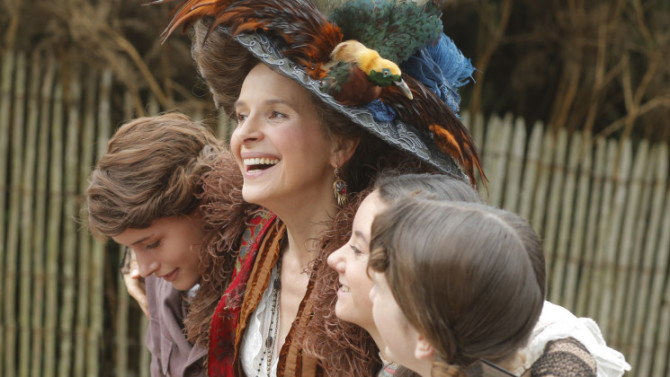At selected cinemas nationwide now.
It’s a brave comedy that sets out to deliberately alienate its audience, but Slack Bay is no ordinary comedy. Bruno Dumont, previously known for his minimalist, decidedly humourless earlier work like Hors Satan and L’Humanité, throws incest, cannibalism, slapstick, misanthropy and sumptuous period detail into some unholy cinematic cauldron and stirs like Macbeth‘s witches. The resulting concoction will strip the gums with its initial impact but offer no lasting intoxication.
The bumbling, flamboyant Van Peteghem family arrive en-masse to their holiday home on the titular bay just as a spate of disappearances are being investigated by two inept Laurel and Hardy-like detectives. The counterpoint to these inbred buffoons are the insular, surly locals, the Bruforts. Though opposite in demeanour, they paddle in a similarly shallow genetic pool. The Brufort’s eldest child La Moute (a roughly charismatic debut from Brandon Lavieville) forms a tentative romance with the androgynous Billie Van Peteghem (the actor credited only as “Raph“).
Early in the film it’s established that the jug-eared Bruforts are responsible for the disappearances; beating the luckless tourists to death and eating the remains. Despite this obvious villainy, the Bruforts aren’t cast any more as antagonists than the hideous toffs that have descended on their territory. The Van Pateghems are a repulsive bunch composed of French acting royalty like Fabrice Luchini and Juliette Binoche, patronising to the local residents and dripping in gooey entitlement.
It’s not necessary a fatal flaw for a film to be totally inconsistent, but the switches in Slack Bay are almost neck-breaking, and soon become wearying as the narrative shuffles past the two hour mark with the drive and momentum of a man digging his own grave. In place of an engaging story are innumerable slapstick interludes that lead to nowhere, most of them at the expense of the rotund Inspector Machin (Didier Desprès); and moments of genuine horror delivered in the most throwaway fashion. When random outbreaks of levitation start occurring, one’s patience is stretched like a ruptured cruciate.
In fairness, there are some instances of real hilarity, and even during its worst excesses, it’s possible to chuckle out of sheer incredulity. It also has to be said that it looks stunning; cinematographer Guillaume Deffontaines making the most of the rugged Pas-de-Calais coast, which looks like it could have been chewed into existence by some of the performances. You’ve never seen the elegant, exquisitely controlled Juliette Binoche overplay like this before.
It’s difficult to entirely hate a film that so resolutely refuses to play by any rules of taste or logic, although many undoubtedly will try their hardest. The best one can say to describe it is to imagine a Fellini-style cavalcade of the grotesque, if the Italian maestro had hated his characters. It’s certainly unique, but it’s a slice of Gallic insanity that won’t sit well with most.


Comments